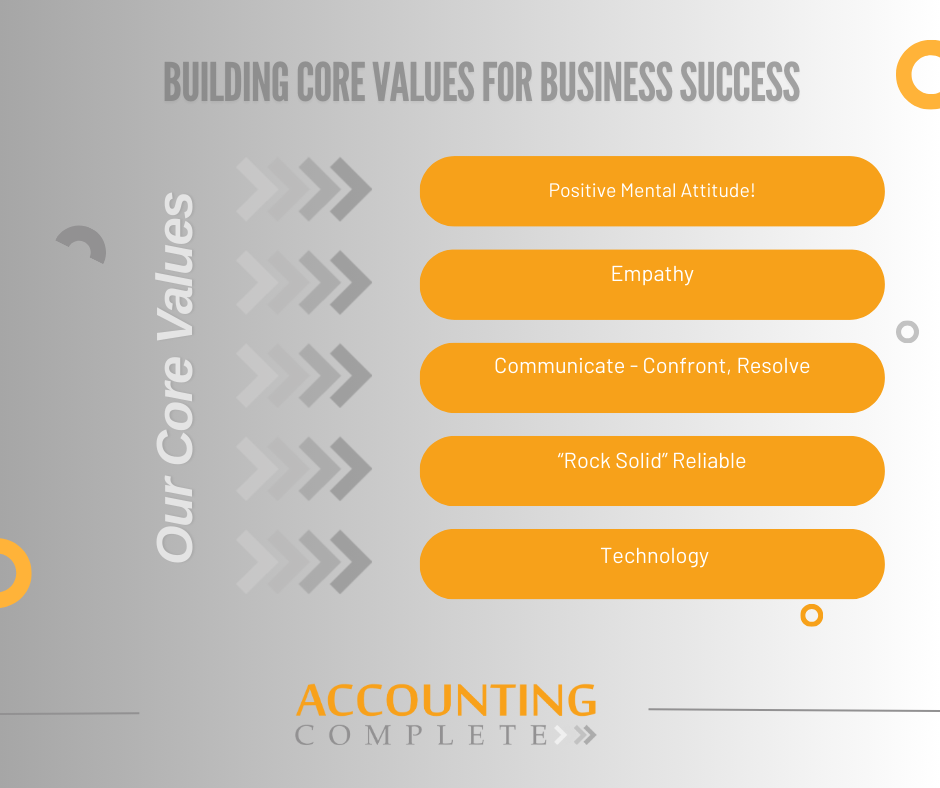
In today’s competitive business environment, core values serve as a compass that guides companies through daily operations, customer interactions, and long-term decisions. For companies like Accounting Complete, these values are more than just words—they’re foundational principles that define our identity, inform our culture, and drive our performance. In this post, we’ll explore why core values are essential to business success and provide steps for developing core values that align with your business vision and mission.
Why Core Values Matter
Core values are vital because they:
- Shape Company Culture: Core values create a unified sense of purpose and set behavioral expectations within a company. When team members share common values, they work more cohesively, fostering a positive and productive workplace culture.
- Guide Decision-Making: When faced with challenging decisions, core values act as a reference point to ensure actions align with the company’s beliefs and standards. This consistency builds trust and clarity, both internally and with clients.
- Build Client Trust and Loyalty: Clients are more likely to stay loyal to companies that demonstrate integrity, empathy, and dependability. When your clients see you staying true to your values, they’ll recognize your commitment to their success and satisfaction.
- Enhance Employee Satisfaction and Retention: Core values give employees a reason to believe in their work and feel motivated. When employees share and believe in a company’s values, they’re more engaged and committed, which leads to higher retention rates.
How to Develop Core Values
Developing core values involves thoughtful consideration and collaboration. Here are some steps to help define values that inspire your team and resonate with your clients.
1. Reflect on Your Vision and Mission
Core values should stem from the company’s overarching mission and vision. Reflect on questions like: What impact do you want your business to make? How do you want your clients and employees to perceive your brand? Your answers will guide the development of values aligned with these goals.
2. Involve Key Stakeholders
Including leadership and employees in this process fosters a sense of ownership and ensures values reflect the broader team. By consulting with stakeholders, you’ll gain diverse perspectives on what defines your company and what should remain at its core. For example, we at Accounting Complete understand that empathy, reliability, and communication are essential, so we crafted our values around these qualities to reflect the contributions of everyone on our team.
3. Define and Clarify Your Values
Once you’ve gathered ideas, identify the core values that best represent your company’s purpose and culture. At Accounting Complete, we have crafted five key values that define who we are:
- Positive Mental Attitude (PMA): We commit to cultivating a PMA every day, recognizing that a positive outlook helps us and our clients overcome challenges. It’s not only about being optimistic but also resilient and proactive.
- Empathy: Understanding our clients’ needs means more than offering solutions. By “putting ourselves in their shoes,” we can address issues from their perspective, creating more robust, trust-based relationships.
- Communicate-Confront-Resolve: Communication is vital in any team, especially in accounting, where details matter. This approach promotes transparency and accountability, allowing us to work together to confront and resolve issues effectively.
- Rock Solid Reliability: Dependability is a cornerstone of our service. Clients need a partner they can count on, and we’re proud to be their consistent and steadfast presence.
- Technology: In a field where precision and timeliness are critical, we’re committed to using the best tools to better serve our clients. Technology allows us to streamline operations, improve accuracy, and adapt to changing client needs.
4. Make Values Actionable
A list of values is just the beginning. To make them meaningful, define what each value looks like in action. For instance, at Accounting Complete, a positive attitude means showing up daily with a solution-focused mindset, and rock-solid reliability means meeting deadlines without fail. Break down each value into specific, observable actions that employees can incorporate into their daily work.
5. Communicate and Reinforce Your Values
Once you’ve established your values, ensure they’re visible in every aspect of your business. Communicate them consistently, and recognize employees who exemplify these values. Hold training sessions, incorporate values into company meetings, and celebrate achievements that reflect your values. Consistent reinforcement will help turn these values into habits.
6. Evaluate and Adapt
Business is dynamic, and as your company grows, you may need to revisit and refine your core values. Periodic evaluation helps ensure that your values reflect your team’s needs and your company’s mission. Stay flexible, and make adjustments as needed, especially in response to new industry challenges or client needs.
Conclusion
Defining and embedding core values within your business can be transformative. These values offer a shared language and understanding that guides every interaction, both within your team and with your clients. At Accounting Complete, we are proud to embody values like empathy, communication, and reliability as they help us deliver exceptional service, strengthen relationships, and build a lasting legacy.
By following these steps and developing meaningful core values, your business can cultivate a strong foundation for growth and a culture that resonates with both employees and clients.
Learn more about our core values and staff members at Accounting Complete – Who We Are.
For more insights on building strong core values and fostering a positive workplace culture, visit the links below.
How to Establish Core Values and Vision for Your Accounting Firm
6 Examples of Effective Core Company Values
